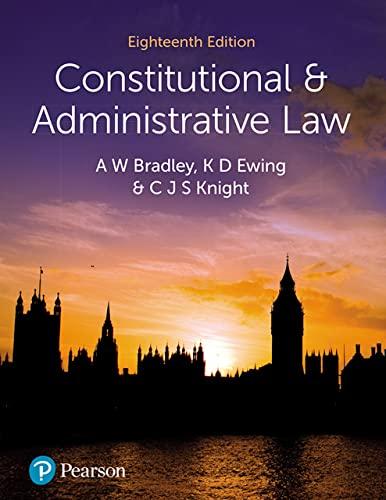Answered step by step
Verified Expert Solution
Question
1 Approved Answer
ch 7 response to this discussion prompt by March 08, 2024 at 11:59 pm. You might consider the following suggestions to help you get started
ch 7
response to this discussion prompt by March 08, 2024 at 11:59 pm. You might consider the following suggestions to help you get started with typing in the reply box:
- Know the different parties to crime and appreciate the difference between complicity and vicarious liability.
- Appreciate that participants before and during the commission of a crime (accomplices) are guilty of the crime itself.
- Know that mere presence or inaction isn't enough to establish accomplice actus reus; the defendant had to take some positive act to aid the commission of the offense.
- Appreciate that courts are divided over whether knowledge is sufficient to prove accomplice mens rea.
- Understand that participants after the commission of crimes (accessories) are guilty of a separate, less serious offense.
- Understand that vicarious liability transfers the actus reus and mens rea from one person to another because of their relationship.
- Understand that vicarious liability can apply either to enterprises (mostly businesses) or to individuals.
Also 2 agreement statements of different views
ch 8
response to this discussion prompt by arch 15, 2024 at 11:59 pm. You might consider the following suggestions to help you get started with typing in the reply box:
- Understand that inchoate offenses punish people for taking some steps towards a criminal purpose, but not enough steps to complete the intended crime.
- Appreciate the long history of attempt law and to understand that criminal attempt liability is based on two rationales: preventing dangerous conduct and neutralizing dangerous people.
- Know the mens rea of criminal attempt is always the purpose or specific intent to commit a specific crime.
- Understand that the actus reus of attempt is an act that goes beyond mere preparation but not enough to complete the crime.
- Understand the difference between legal and factual impossibility and to know that legal impossibility is a defense to criminal liability but factual possibility is not.
- Know that voluntary and abandonment of an attempt in progress is a defense to criminal liability in about half the states.
- Understand that punishing conspiracy is based on preventing crimes by recognizing the special danger of group criminality.
- Understand that conspiracy actus reus consists of two parts: an agreement to commit a crime and an overt act in furtherance of the agreement.
- Understand the relationship between the parties to conspiracy and to know that large- scale conspiracies fall into two major categories: wheel conspiracies and chain conspiracies.
- Understand the Racketeer Influenced and Corrupt Organizations (RICO) Act and how it works against organized crime.
- Understand that punishing solicitation, or trying to get someone else to commit a crime, is based on the same idea as punishing conspiracy: to prevent crimes before they start by anticipating the dangers of group criminality.
Also 2 agreement statements of different views
Step by Step Solution
There are 3 Steps involved in it
Step: 1

Get Instant Access to Expert-Tailored Solutions
See step-by-step solutions with expert insights and AI powered tools for academic success
Step: 2

Step: 3

Ace Your Homework with AI
Get the answers you need in no time with our AI-driven, step-by-step assistance
Get Started


